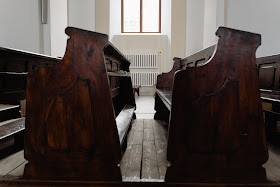For my part, as you know, if you've read my books or followed this blog, I have consistently pointed people toward the church. And I, myself, am deeply involved with and committed to my own church. But I have to admit, being a cheerleader for the church has been hard to do. I know I'm preaching a message to a deeply skeptical, cynical and wounded audience.
For the most part, I've remained an optimistic Pied Piper about local churches. I've been able to maintain this positivity because of my own close involvement with a church. I know the difference between Twitter and real life. Specifically, the conversation about "the church" on social media is nothing like what I see on a Sunday morning. What gets elevated and amplified on social media are the disasters. And those disasters are real. But 99.9% of all the good and lovely things that happen in local churches during the week are too boring to ever warrant a post, tweet, mention, news article, or podcast. When I defend the church I'm not defending the visible disasters, but the 99.9% of the church no one ever sees. And you only get to see this stuff if you show up regularly. I'll say this clearly: Perception is a matter of involvement. You can't see the church clearly if you aren't regularly involved with a local faith community.
That said, I recently had a bit of an existential crisis regarding the church. I had a (pretty long) moment of despair.
What precipitated this crisis? I think it was just all the accumulated disasters, surveying the vast wreckage that is the Christian witness in the world. The Catholic child abuse crisis. The Russian Orthodox church supporting the invasion and war with Ukraine. The Southern Baptist Convention report on sexual abuse. Story after story of high profile pastors engaged in sexual misconduct. The #ChurchToo moment. Evangelicals embracing QAnon and Stop the Steal conspiracy theories. It all just added up.
It's not that I hadn't despaired about any of this before. I had. Each bit of bad news about the church like a punch in the gut. But like I said above, I've tended to see these catastrophes as exceptions rather than the rule. My crisis was precipitated, however, by seriously considering if the reverse might not be true. What if a sane and healthy Christianity is pretty exceptional and rare? And if it is exceptional and rare, what are the implications of that?
For example, if a sane and healthy Christianity is exceptional and rare, is it wise to recommend the faith to others? Statistically speaking, will the new convert be able to find and hit that small bullseye? When you recommend the church to others are they able to find that exceptional community where all is healthy, sane, and safe? Or will they, given the small odds of success, be pulled into a vortex of chaos and dysfunction?
Phrased differently, I have been able to make it across the treacherous rapids to find safe harbor. I'm downstream of the danger. But how confident am I, if I invite someone into the waters upstream of the rapids, that they'll make it safely to where I'm standing now?
This was the origin of my existential crisis. If a sane and healthy Christianity is a narrow path, a needle in a haystack, an easy target to miss, and the navigation of dangerous rapids, how can I confidently ask people step into this journey?
You might be asking such questions yourself. This series will be sharing all the random thoughts that my existential crisis kicked off in my head.

No comments:
Post a Comment